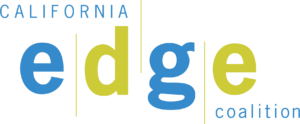Today, Governor Newsom released the 2021-2022 proposed state budget – with a total of $227.2 billion in critical funding. The California EDGE Coalition applauds the Governor for making significant investments in workforce development and recognizing the important role community colleges and the business community play to help bolster California’s economic recovery. Listed below is a preliminary snapshot of the 2021-2022 budget proposal. A deeper analysis and budget summary is forthcoming.
- Parent’s Agenda
- $44million ongoing funds for childcare services.
- $250mil incentive grants for transitional kindergarten programs.
- $1billion anticipated in federal funding for early childhood and Head Start programs.
- $75million ongoing to assist our immigrant families and communities.
- Higher Education
- Community Colleges:
- The budget stabilizes community college districts’ funding by buying down $1.1 billion in deferrals.
- $250 million investment for student financial aid grants.
- $150 million one-time emergency financial aid for low-income students.
- $20 million one-time to bolster community college student retention rates.
- $100million for student basic needs, food, and housing.
- $10 million ongoing to support distance learning, including counseling and tutoring services.
- $2.5 million to support dual enrollment students.
- $1million ongoing to support Adult Education Program.
- $3 billion anticipated assistance in federal funding for the higher education system.
- Cradle to Career Data System: $15 million to establish an office within GovOps to support the data system’s governance structure, maintenance of the system, and so forth, with an additional $3.8 mil ongoing to provide public facing support for families and students to navigate the system.
- Community Colleges:
- Workforce Development
- Total of $353 million investment for CA’s workforce development.
- $250 million that will strengthen the link between higher education and gainful employment. Higher education segments will be expected to better connect students learning to workforce and industry needs.
- $25 million one time for High Road Training Partnerships
- $8.5 million for construction apprenticeships to help meet housing goals.
- $4 million to expand training in healthcare workforce.
- $4 million for Youth Works – a pilot training partnership for youth in SoCal and Bay Area.
- $2 million for cybersecurity apprenticeship programs.
- $35 million to expands work-based learning:
- $15 million ongoing for the CA Apprenticeship Initiative.
- $20 million one time to expand work-based learning models at community colleges, including working with faculty and industry partners to incorporate work-based learning curriculum.
- $2.4 billion to fund the Golden State Stimulus: $600 dollars in direct payments to estimated 4 million Californians.
- New Department of Jobs and Higher Wages coming soon, which will consolidate CWDB, EDD, ETP, DIR, apprenticeship/workforce training programs.
- The Future of Work Commission report will be released this month that will focus on the impact of technology to the workforce, job quality, wages, worker safety nets and workforce training.
- Business Community
- $575 million in grants for small businesses and cultural non-profits.
- $71 million in fee waivers for small businesses.
- $100 million for IBank loan program for small businesses.
- $430 million for Cal Competes to accelerate job creation throughout the state.
- $35 million one-time funding for the CA Dream Fund to support microgrants – up to $10k for small businesses and entrepreneurship programs for underserved groups.
Again, we appreciate the Governor’s budget prioritizing California’s workers and businesses that have been impacted the most, and we know there will be much work to do to help lift families out of poverty, upskill and retrain dislocated workers to obtain family-sustaining jobs, ensure low-income students and adult learners have the support they need to complete their degrees, all while securing resources through a racial and economic equity lens. The CA EDGE Coalition looks forward to working with the administration, legislature, and stakeholder partners to ensure our business community, workers, students, and underserved communities are provided the support they need as the ongoing pandemic continues.
